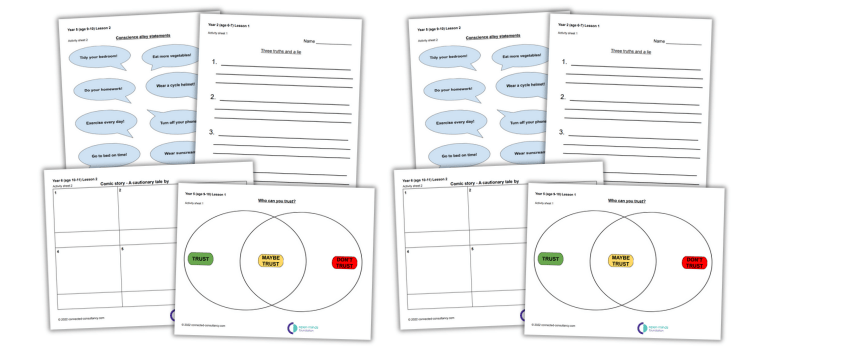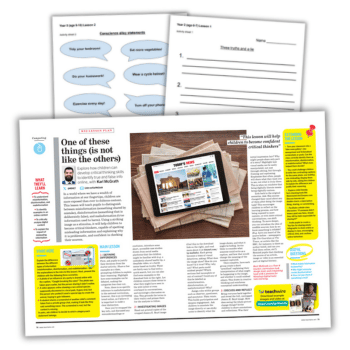PDF lesson plans, worksheets, deepfake movie clip
KS1, KS2
Years 2-6
Why teach critical thinking?
For children, critical thinking is a skill that we can introduce to encourage lateral thinking and build pupils’ confidence. Being able to think critically helps children develop their own opinions and, importantly, gives them the agency to lead happy and healthy lives.
Critical thinking is an essential skill to complement fact and knowledge-based learning.
Identifying true and false info online
Explore how children can develop critical thinking skills to identify true and false info online with Karl McGrath’s lesson plan…
In a world where we have a wealth of information at our fingertips, children are more exposed than ever to dubious content. This lesson will teach pupils to distinguish between:
- misinformation (something shared by mistake)
- disinformation (something that is deliberately false)
- malinformation (true information used to harm)
Using a striking image as a stimulus, it will help children to become critical thinkers, capable of spotting misleading information and explaining why it is problematic, and confident in checking their sources.
Critical thinking learning objectives
- Understand misinformation, disinformation, and malinformation
- Identify examples in an online context
- Critically analyse digital content
- Explain the impact of misleading information
Karl McGrath is a Year 6 teacher, curriculum task design lead, and computing lead with a passion for blending digital tools into learning.
Open Minds Foundation critical thinking lesson plans

The Open Minds Foundation has identified a deficit of critical thinking skills in education. Working with 9,500 schools, it has developed a range of critical thinking lesson plans.
Here you can download sample critical thinking lesson plans, with resources for Year 2, Year 5 and Year 6. Find the full set of resources available via Jigsaw PSHE.
Year 2 critical thinking lesson plan
Key learning: Why do people tell lies?
Learning objectives: Understand that some people tell lies and that this is wrong
Critical thinking skills
- Curiosity: How can we be sure something is honest and true?
- Evidence: What facts do we need to find out if something is true?
- Problem solving: Be aware of the need to think critically when analysing and deciding how true and fair something is
Year 5 critical thinking lesson plans
Lesson 1
Key learning: How do you know who to trust?
Learning objectives: Question who we trust
Critical thinking skills
- Curiosity: What is trust?
- Evidence: What values make someone trustworthy?
- Problem solving: How can we trust someone?
Key learning: How do you know who to trust?
Learning objectives: Question who we trust
Lesson 2
Key learning: What is manipulation and how can we be aware of it?
Learning objectives: Understand that we may be manipulated and how to avoid this from happening
Critical thinking skills
- Curiosity: What is manipulation?
- Evidence: Why do people get manipulated?
- Problem solving: How do we reduce the risk of being manipulated and what do we do if we find out that we are?
Year 6 critical thinking lesson plan
Key learning: Who can we trust online?
Learning objectives: Learn that it is difficult to know who to trust when online and that grooming can occur
Critical thinking skills
- Curiosity: Can we trust what we read and see online?
- Evidence: How do we know who to trust online?
- Problem solving: How can we get help if we believe we are being groomed?
The Open Minds Foundation is a non-profit, charitable organisation, established to raise awareness of and educate on the dangers of coercion and coercive control.














